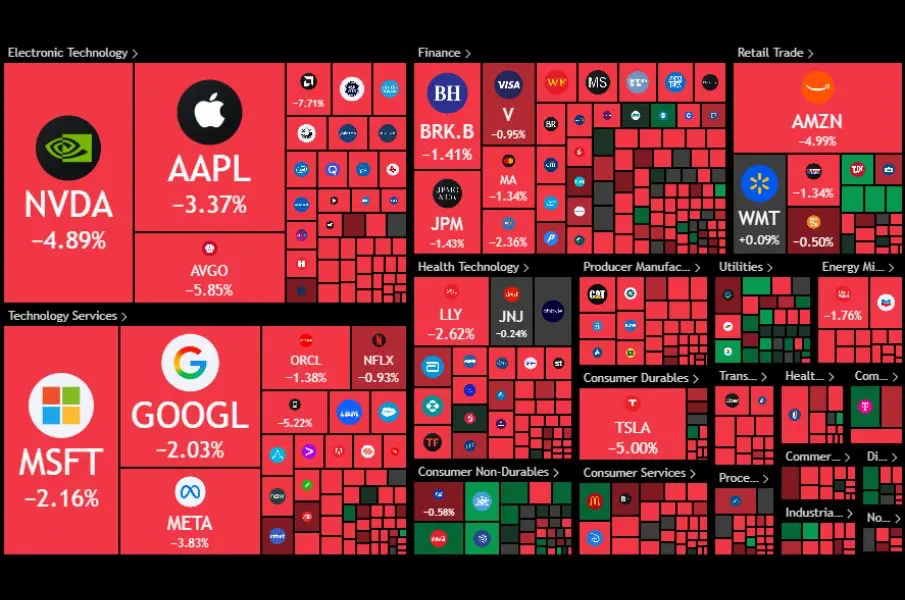The American financial markets experienced on Friday a rare combination of overvaluation, nervousness, and political unpredictability. The trigger was not a macroeconomic shock but a message from the president. Donald Trump announced that he was considering a “massive increase of tariffs” on Chinese imports. Within hours, the announcement set off a cascade of losses whose speed recalled August 2019. The S&P 500 closed 2.7 percent lower, the Nasdaq fell 3.6 percent, and the capital markets signaled what economists had feared for months - an abrupt correction after an overextended upward phase.
The background is clear: after a rally of more than 35 percent since April, the valuation of American stocks had risen to a level that could no longer be justified by fundamentals. Expectations in the technology sector, particularly for companies in artificial intelligence, had condensed into a speculative narrative that depended entirely on stability in trade policy. When Trump, with a single sentence, called that stability into question, the psychological ground on which the entire upswing rested collapsed.
The justification for the renewed tariff threat is economically transparent. China restricted exports of certain rare earths in September - materials essential for semiconductors, batteries, and aircraft turbines. Trump’s response is less industrial policy than symbolism: he uses the trade deficit as a domestic political instrument of pressure, even though it has stagnated in the real economy for months. The effect, however, is real - capital flees from risk assets, and volatility rises.
The market did not react in isolation. Risk aversion spread to energy and commodity prices. U.S. crude oil fell 4.2 percent to 58.90 dollars, Brent 3.8 percent to 62.73 dollars - not because of a recession, but due to a correction in geopolitical risk: the ceasefire between Israel and Hamas reduced the premium that investors had previously priced in for stability in the Middle East. Combined with the prospect of declining demand due to possible trade barriers, a short-term deflationary impulse emerged, immediately reflected in yields. The ten-year Treasury fell to 4.04 percent. Macroeconomically, the situation is precarious. The U.S. economy shows signs of structural fatigue, consumer sentiment remains at a low level according to the University of Michigan, and real wages are stagnant. The Federal Reserve’s rate cut in September has barely stimulated demand; at the same time, Trump’s tariffs are increasing inflationary risk. The central bank thus faces a classic dilemma: an expansive monetary policy could inflate the stock bubble once more, while a restrictive stance could completely undermine confidence in the economy.
What is remarkable is the selectivity of the market reaction. High-capitalization technology companies lost disproportionately, while defensive sectors - such as utilities and basic consumer goods - remained relatively stable. This rotation indicates a partial flight toward valuation logic: investors are once again differentiating between growth narrative and earning power. In this sense, the correction is not chaos but a return to rationality - a market resisting political overreach. Yet the political component remains central. The fact that the president, on the eve of his meeting with the South Korean government, cancels negotiations with China and rhetorically escalates the confrontation sends a signal far beyond the markets. It undermines the credibility of the United States as a trade policy actor. Partner countries, especially in Asia, must once again ask whether Washington is still capable of conducting predictable economic policy.
In sum, this Friday is less a crash than a revelation. It shows how closely psychology and politics are intertwined in the current financial system - and how dangerous the global markets’ dependence on the mood of one individual has become. Wall Street did not react to China but to the loss of predictability.
For investors, this is not a short-term phenomenon but a symptom of a deeper erosion: a political economy in which economic rationality is regularly sacrificed to tactical impulse. And so this day does not end in panic but in a sobering realization: the greatest uncertainty of the world economy is no longer the risk from Beijing - but the hand that guides it in Washington.
Investigative journalism requires courage, conviction – and your support.
Please also strengthen our journalistic fight against right-wing populism and human rights violations. We do not want to finance ourselves through a paywall so that everyone can read our research – regardless of income or origin. Thank you very much!


Dazu passt die Entwicklung des Goldpreises. Es ist ein barbarisches Metall, das Bedeutung gewinnt in einer barbarisch agierenden Welt. Mit WTO-Regeln,Handelsabkommen und stabiler Aussicht auf Frieden sollte das Halten oder Besitzen von Gold nicht nötig sein.
Wie oft noch?
Heute Zölle androhen, dann die Frist verlängern, dann zurück nehmen, wieder neu drohen.
Eine Endlosschleife.
Wer verdient? Die, die wissen, wann man kaufen muss… wohlwissend, dass Trump es wieder zurück nimmt und man mit Verkauf viel Geld macht.
Auch das passiert nicht zum ersten Mal.
Ich erinnere mich da an einen guten Bericht von Euch.
Und über den „in kürze fixen TikTok Deal“?
Hört man auch nichts mehr davon.
Hauptsache man füllt sich selbst die Taschen und lenkt von den Epstein Files ab.